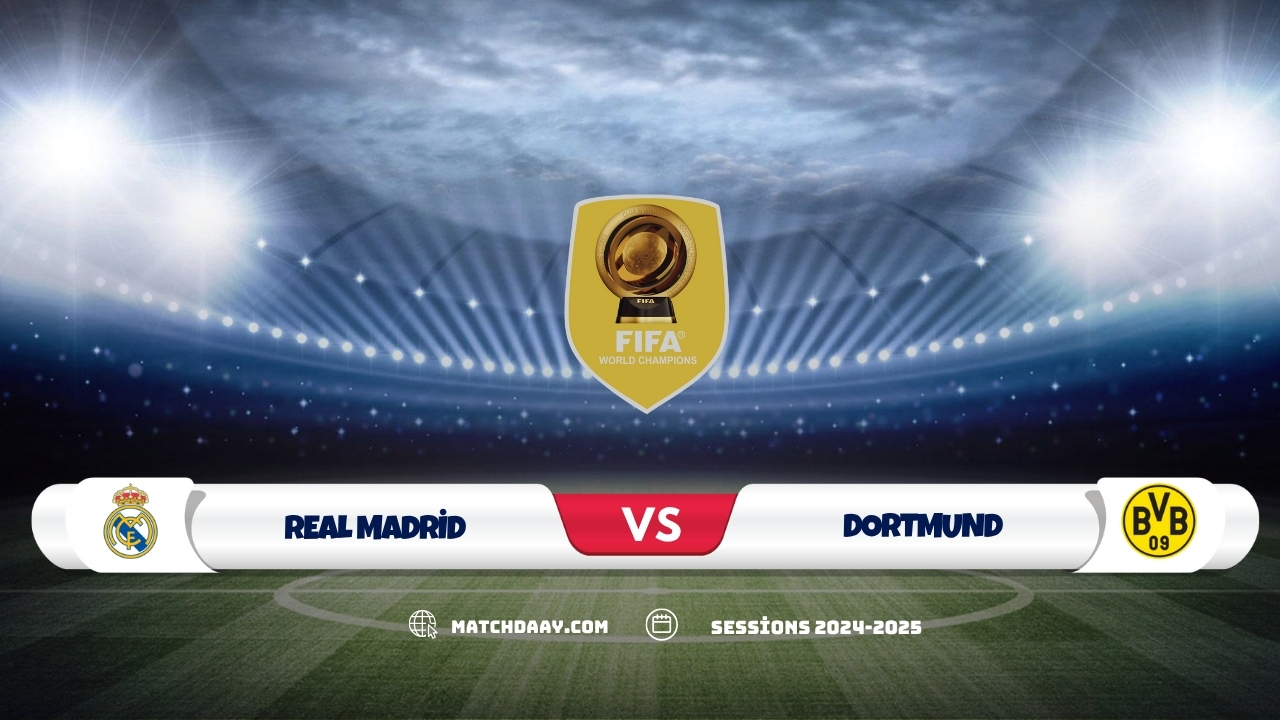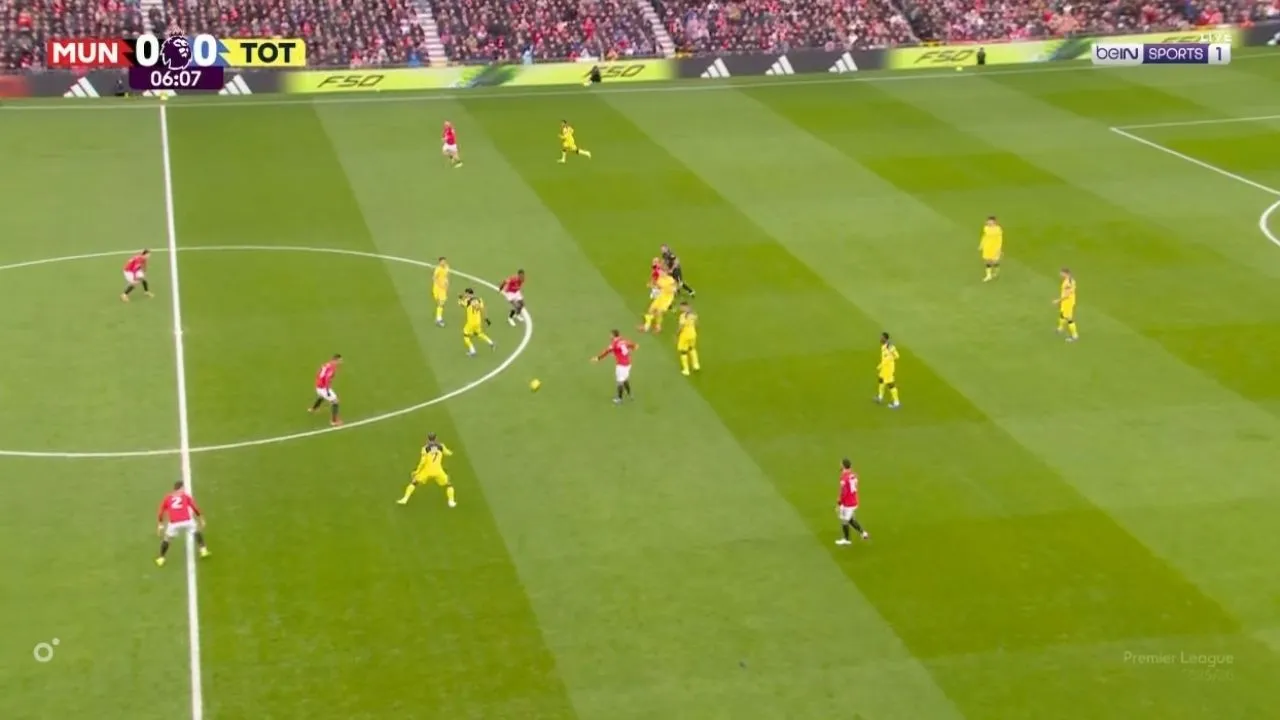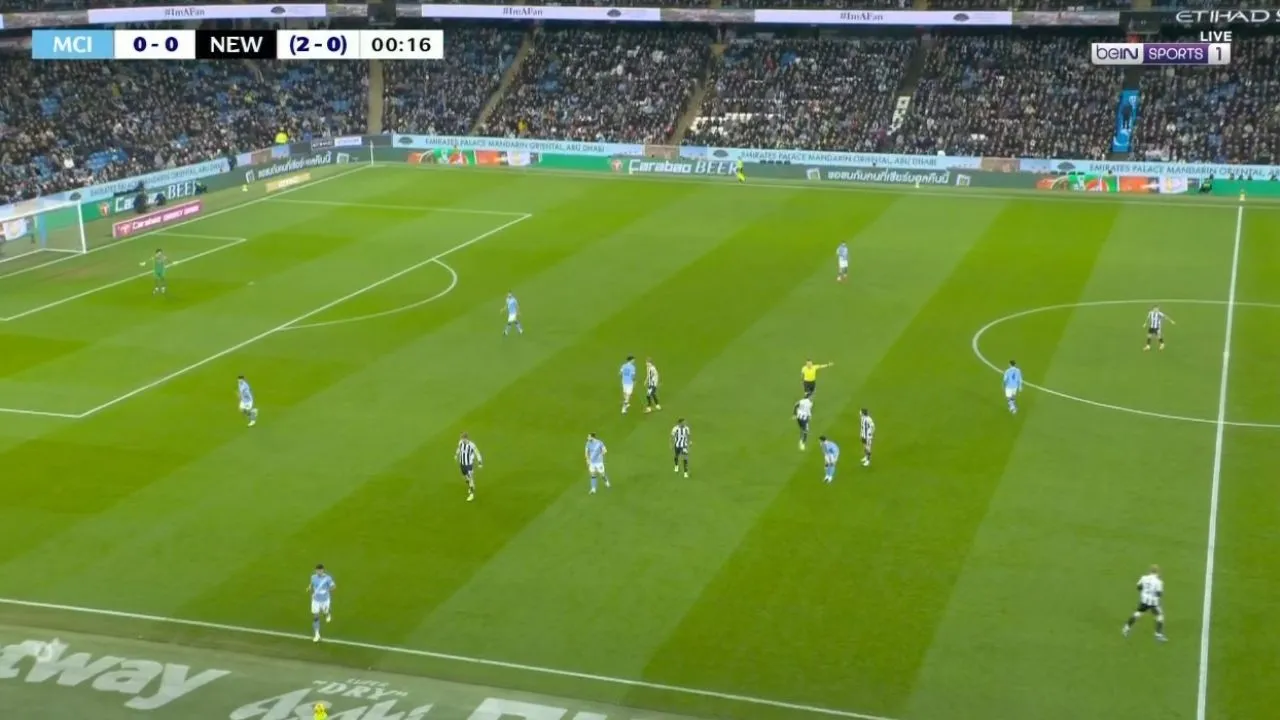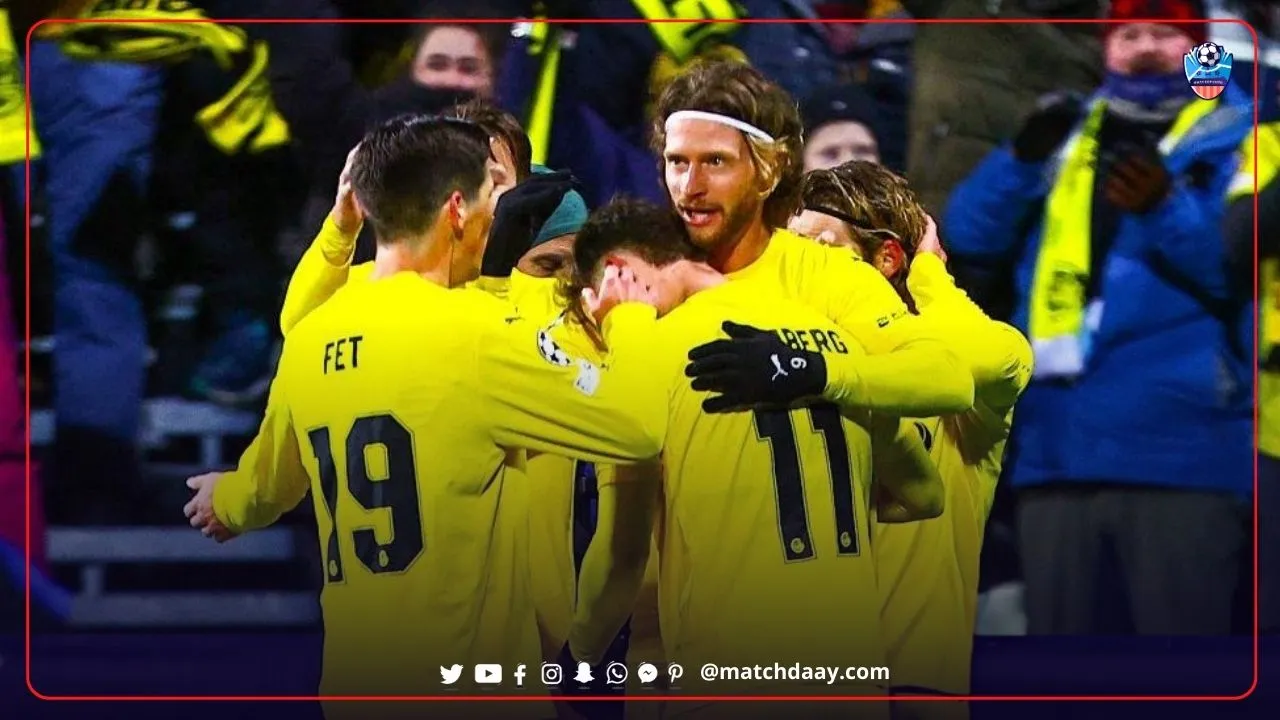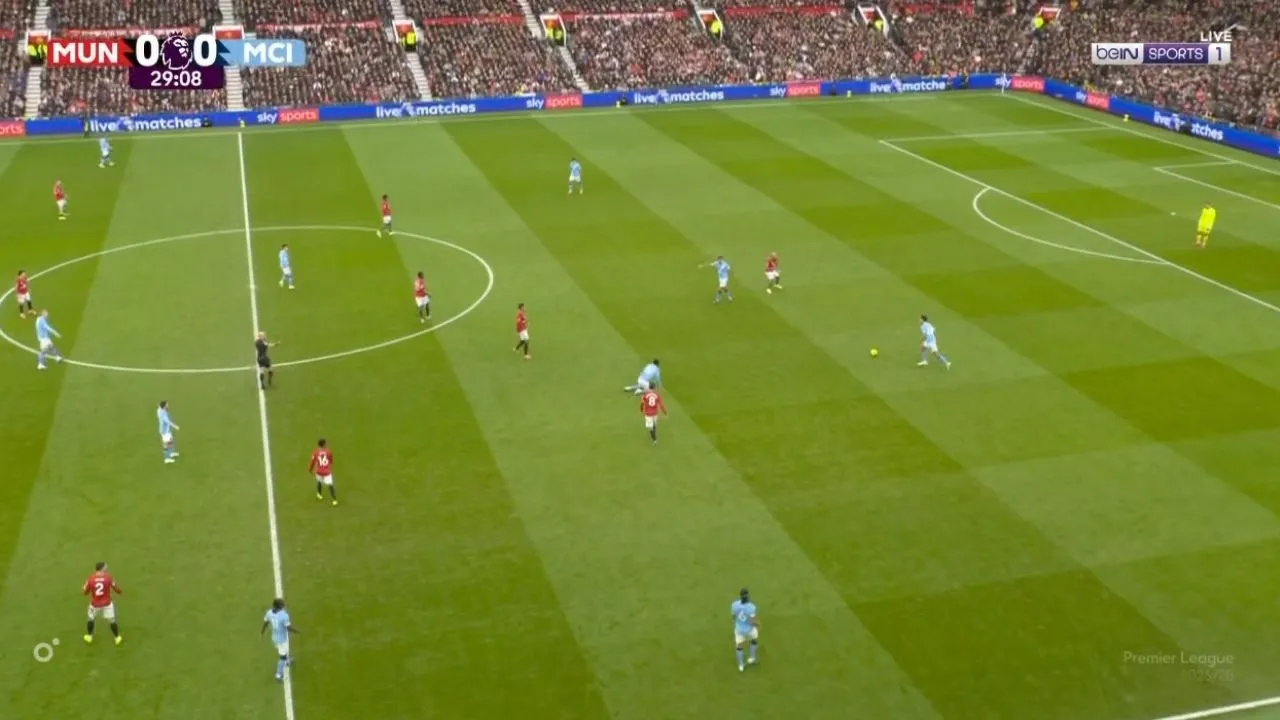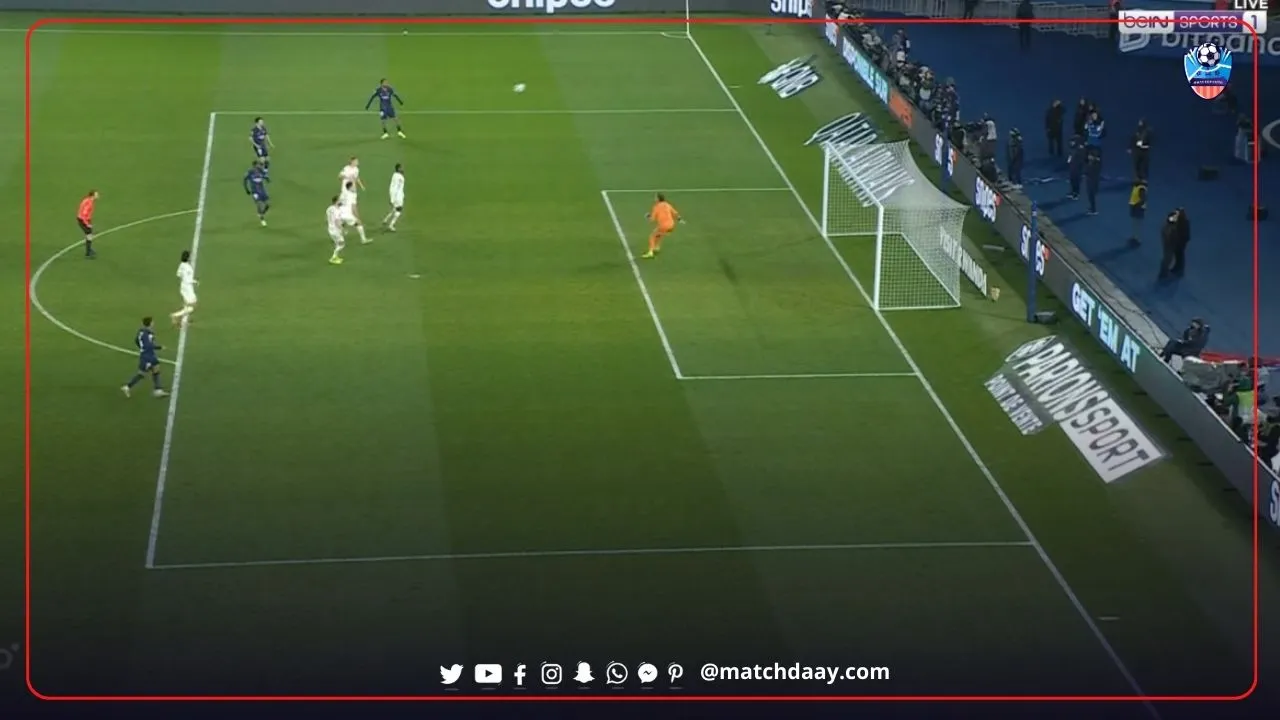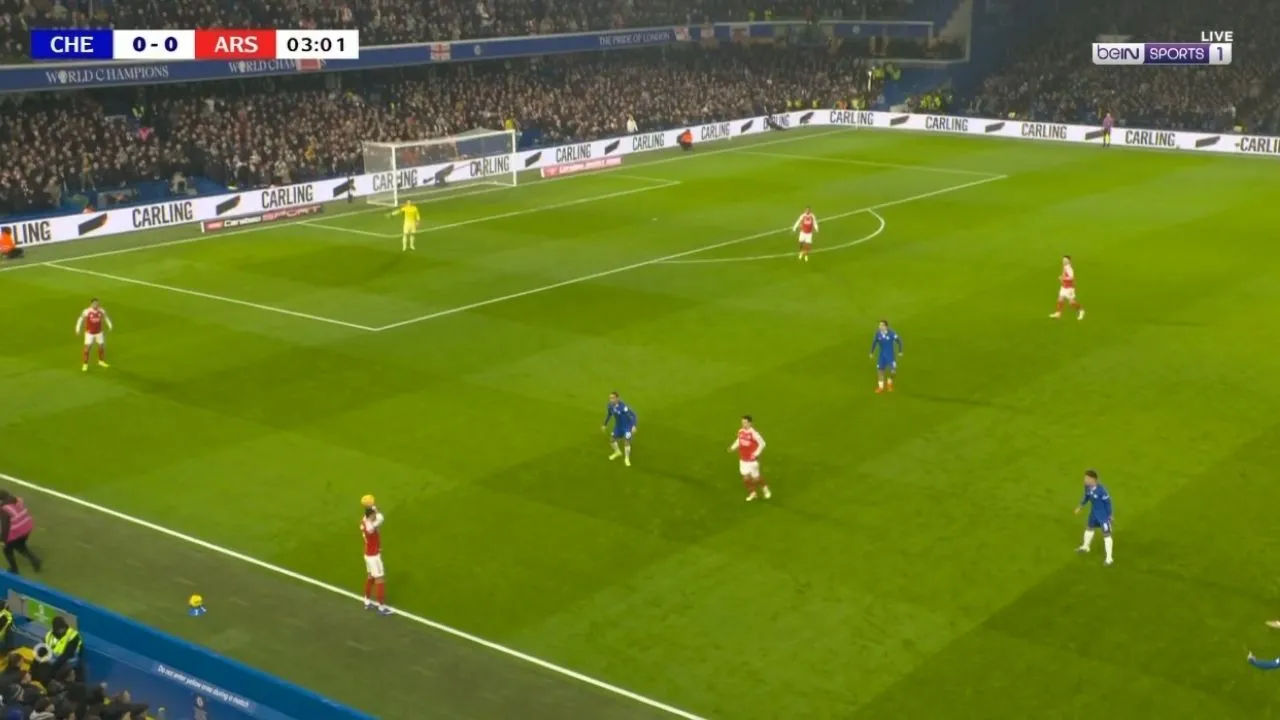 FIFA Club World Cup
FIFA Club World Cup Real Madrid
Real Madrid Borussia Dortmund
Borussia Dortmund- Info
- Lineups
- Stats
- Events
- Standings
| Date | July 5, 2025 |
|---|---|
| Time | 21:00 |
| League | FIFA Club World Cup |
| Status | FT |
Group D
| # | Team | P | W | D | L | Pts |
|---|---|---|---|---|---|---|
| 1 |
 Flamengo
Flamengo | 3 | 2 | 1 | 0 | 7 |
| 2 |
 Chelsea
Chelsea | 3 | 2 | 0 | 1 | 6 |
| 3 |
 ES Tunis
ES Tunis | 3 | 1 | 0 | 2 | 3 |
| 4 |
 Los Angeles FC
Los Angeles FC | 3 | 0 | 1 | 2 | 1 |
Group G
| # | Team | P | W | D | L | Pts |
|---|---|---|---|---|---|---|
| 1 |
 Manchester City
Manchester City | 3 | 3 | 0 | 0 | 9 |
| 2 |
 Juventus
Juventus | 3 | 2 | 0 | 1 | 6 |
| 3 |
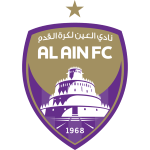 Al Ain
Al Ain | 3 | 1 | 0 | 2 | 3 |
| 4 |
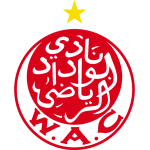 Wydad AC
Wydad AC | 3 | 0 | 0 | 3 | 0 |
Group B
| # | Team | P | W | D | L | Pts |
|---|---|---|---|---|---|---|
| 1 |
 Paris Saint Germain
Paris Saint Germain | 3 | 2 | 0 | 1 | 6 |
| 2 |
 Botafogo
Botafogo | 3 | 2 | 0 | 1 | 6 |
| 3 |
 Atletico Madrid
Atletico Madrid | 3 | 2 | 0 | 1 | 6 |
| 4 |
 Seattle Sounders
Seattle Sounders | 3 | 0 | 0 | 3 | 0 |
Group A
| # | Team | P | W | D | L | Pts |
|---|---|---|---|---|---|---|
| 1 |
 Palmeiras
Palmeiras | 3 | 1 | 2 | 0 | 5 |
| 2 |
 Inter Miami
Inter Miami | 3 | 1 | 2 | 0 | 5 |
| 3 |
 FC Porto
FC Porto | 3 | 0 | 2 | 1 | 2 |
| 4 |
 Al Ahly
Al Ahly | 3 | 0 | 2 | 1 | 2 |
Group F
| # | Team | P | W | D | L | Pts |
|---|---|---|---|---|---|---|
| 1 |
 Borussia Dortmund
Borussia Dortmund | 3 | 2 | 1 | 0 | 7 |
| 2 |
 Fluminense
Fluminense | 3 | 1 | 2 | 0 | 5 |
| 3 |
 Mamelodi Sundowns
Mamelodi Sundowns | 3 | 1 | 1 | 1 | 4 |
| 4 |
 Ulsan Hyundai FC
Ulsan Hyundai FC | 3 | 0 | 0 | 3 | 0 |
Group C
| # | Team | P | W | D | L | Pts |
|---|---|---|---|---|---|---|
| 1 |
 Benfica
Benfica | 3 | 2 | 1 | 0 | 7 |
| 2 |
 Bayern München
Bayern München | 3 | 2 | 0 | 1 | 6 |
| 3 |
 Boca Juniors
Boca Juniors | 3 | 0 | 2 | 1 | 2 |
| 4 |
 Auckland City
Auckland City | 3 | 0 | 1 | 2 | 1 |
Group E
| # | Team | P | W | D | L | Pts |
|---|---|---|---|---|---|---|
| 1 |
 Inter
Inter | 3 | 2 | 1 | 0 | 7 |
| 2 |
 Monterrey
Monterrey | 3 | 1 | 2 | 0 | 5 |
| 3 |
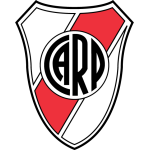 River Plate
River Plate | 3 | 1 | 1 | 1 | 4 |
| 4 |
 Urawa
Urawa | 3 | 0 | 0 | 3 | 0 |
Group H
| # | Team | P | W | D | L | Pts |
|---|---|---|---|---|---|---|
| 1 |
 Real Madrid
Real Madrid | 3 | 2 | 1 | 0 | 7 |
| 2 |
 Al-Hilal Saudi FC
Al-Hilal Saudi FC | 3 | 1 | 2 | 0 | 5 |
| 3 |
 Red Bull Salzburg
Red Bull Salzburg | 3 | 1 | 1 | 1 | 4 |
| 4 |
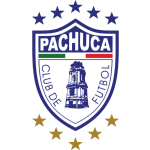 Pachuca
Pachuca | 3 | 0 | 0 | 3 | 0 |
The 2025 FIFA Club World Cup marks a significant evolution in global club football, expanding into an unprecedented 32-team tournament featuring elite clubs from six confederations. Among the most anticipated matchups in this revamped competition is the quarter-final clash between European titans Real Madrid and Borussia Dortmund. This encounter carries particular weight, serving as a compelling rematch of the 2024 UEFA Champions League final and a recent 2024/25 Champions League group stage fixture.
The stakes are exceptionally high as these two European powerhouses vie for a coveted spot in the semi-finals. The tournament’s unique context, being hosted across the United States, adds another layer of intrigue, promising a vibrant atmosphere for this high-stakes contest. Fans globally are eagerly anticipating this encounter, which is set to be a highlight of the summer football calendar.
Quick Navigation: Your Guide to the Real Madrid vs Dortmund Match
- Match Essentials: Real Madrid vs Dortmund Kick-Off Date, Time & Venue
- How to Watch Real Madrid vs Dortmund: TV & Online Streaming
- The Road to the Quarter-Finals: Real Madrid and Dortmund’s Journey
- A Storied Rivalry Renewed: Real Madrid vs Dortmund Head-to-Head
- Real Madrid vs Dortmund: Tactical Preview & Key Narratives
- Team News & Predicted Lineups for Real Madrid vs Dortmund
- Expert Predictions & Betting Odds: Who Will Win Real Madrid vs Dortmund?
- The FIFA Club World Cup 2025: Tournament Context
- Conclusion: An Unmissable Quarter-Final Clash
Match Essentials: Real Madrid vs Dortmund Kick-Off Date, Time & Venue
The Crucial Details: Date and Time
The highly anticipated Real Madrid vs Dortmund quarter-final is officially scheduled for Saturday, July 5, 2025. The kick-off time is set for
4:00 PM ET (Eastern Time). For fans across different time zones, this translates to 9:00 PM BST (British Summer Time) in the UK and 10:00 PM CEST (Central European Summer Time) in Germany and Spain.
The consistent reporting of this match date and time across multiple reliable sources, including major sports broadcasters and official tournament schedules, underscores a fixed and widely publicized schedule. This precision is paramount for a global football audience, enabling fans worldwide to accurately plan their viewing. The inclusion of multiple time zones is a deliberate effort to cater to the diverse international fanbases of both clubs, maximizing potential viewership and engagement. This approach extends beyond merely disseminating information; it actively facilitates participation for a worldwide community, which is a critical factor for driving traffic and interest in sports content.
#FIFACWC Quarter-Finals. 🔜#CWC2025 pic.twitter.com/D8teRKXUIq
— Match Spoots (@matchspoots) July 2, 2025
MetLife Stadium: The Grand Stage
The quarter-final will unfold at the iconic MetLife Stadium in East Rutherford, New Jersey, USA. This colossal venue boasts a seating capacity of 82,500. Its selection as a host stadium for this crucial quarter-final, alongside its role in hosting the tournament final and potentially matches for the 2026 FIFA World Cup, significantly elevates the prestige of this specific fixture.
The choice of such a large, high-profile stadium for a quarter-final signals the immense importance placed on this particular match and the tournament as a whole by FIFA. This indicates a deliberate strategy to showcase top-tier club football in major United States markets, aiming for maximum attendance and broadcast reach. Such an approach directly influences the financial success and global perception of the FIFA Club World Cup, establishing it as a premier event on the international football calendar. The atmosphere at MetLife Stadium for a contest of this magnitude is expected to be electrifying, adding to the spectacle.
How to Watch Real Madrid vs Dortmund: TV & Online Streaming
Global Coverage: DAZN Leads the Way
DAZN has secured the exclusive global broadcasting rights for the 2025 FIFA Club World Cup, making it the primary platform for fans worldwide. All 63 matches of the tournament will be live-streamed for free on DAZN across the globe.
Accessing DAZN is designed to be user-friendly; viewers can download the free DAZN App on various connected devices, including smart TVs, smartphones, tablets, streaming devices, and game consoles, or access it directly via web browsers. Registration typically requires only an email address, with no hidden costs or fees for the free content. This “free-to-view” model for a tournament of this magnitude represents a notable shift in sports broadcasting. It suggests that FIFA and DAZN are prioritizing global reach and fan acquisition over immediate subscription revenue, particularly for this inaugural expanded edition. The underlying implication is a long-term strategy to establish the FIFA Club World Cup as a premier event by making it widely accessible, potentially cultivating a vast audience base that can be monetized in future iterations or through other premium DAZN offerings. This strategic move also reinforces DAZN’s position as a dominant player in the global sports streaming landscape.
Watching in the USA: TNT Sports and More
In the United States, a multi-faceted broadcasting partnership ensures comprehensive coverage. TNT Sports, through its networks TNT, TBS, and truTV, will televise 24 of the 63 tournament matches. This includes a selection of group stage matches, key knockout ties, and the final. DAZN and TNT Sports are further collaborating to enhance the fan experience, co-producing English-language studio programming and engaging in cross-promotion efforts throughout the tournament.
Additionally, TelevisaUnivision will provide extensive Spanish-language coverage, airing 18 matches across its networks Univision, UniMás, and TUDN. This dual broadcast approach—DAZN for all games, TNT Sports for key English-language broadcasts, and TelevisaUnivision for Spanish-language audiences—in the US market reveals a sophisticated multi-platform strategy. This approach is not merely about maximizing reach; it involves segmenting the audience by language and viewing preference, catering to both streaming enthusiasts and traditional television viewers. The collaboration between DAZN and TNT Sports on studio programming indicates a concerted effort to create a holistic, immersive fan experience that extends beyond live matches, aiming to capture and retain diverse viewer demographics. This demonstrates a deep understanding of the varied American sports media landscape and its consumer preferences.
UK and International Broadcast Options
For fans in the United Kingdom, Channel 5 will complement DAZN’s coverage by broadcasting 23 matches. This includes 15 group games, four last-16 ties, two quarter-finals, one semi-final, and the final. This arrangement highlights that while DAZN holds global exclusive streaming rights, the existence of specific regional deals, such as with Channel 5 in the UK, underscores the enduring value of local terrestrial broadcast partnerships.
This suggests that FIFA and DAZN recognize the importance of traditional television access in key football markets, potentially to capture audiences less inclined to stream or to meet specific regulatory requirements. It implies a flexible content licensing model that balances global streaming dominance with strategic local collaborations, ensuring broader market penetration and accessibility for the tournament. For fans outside the US and UK, DAZN remains the primary and most comprehensive option for watching all the action, reinforcing its position as the global home of the FIFA Club World Cup.
The Road to the Quarter-Finals: Real Madrid and Dortmund’s Journey
Real Madrid’s Dominant Path
Real Madrid entered the FIFA Club World Cup 2025 as a formidable contender and successfully navigated their group stage campaign, topping Group H. Their journey began with a 1-1 draw against Al Hilal, followed by decisive victories over Pachuca (3-1) and Red Bull Salzburg (3-0). This unbeaten run and progression, despite a somewhat “sluggish start” to the tournament and the initial absence of star player Kylian Mbappé due to illness, highlights the early influence of new coach Xabi Alonso. His tactical adjustments have visibly contributed to the team’s improved defensive solidity and overall discipline.
In the Round of 16, Real Madrid secured a 1-0 victory over Juventus, with young Gonzalo García scoring the decisive goal. García’s emergence as a key goalscorer in Mbappé’s absence, contributing three goals in four matches , underscores the depth and quality of Real Madrid’s squad, particularly the talent nurtured through their academy, known as “La Fábrica”. This demonstrates that even without their biggest star at full capacity, Real Madrid possesses the tactical flexibility and player quality necessary to navigate challenging tournament fixtures and maintain a strong performance trajectory.
Borussia Dortmund’s Resilient Campaign
Borussia Dortmund also showcased a robust performance in the group stage, topping Group F. Their campaign commenced with a 0-0 draw against Fluminense, followed by an exhilarating 4-3 victory over Mamelodi Sundowns and a 1-0 win against Ulsan HD. This strong form and progression, particularly the high-scoring affair against Mamelodi Sundowns and the consistent goal-scoring of Serhou Guirassy, indicates a team that has been “entertaining to watch” and has “much-improved since the appointment of Niko Kovac”.
In the Round of 16, Dortmund secured a 2-1 win against Monterrey, with Serhou Guirassy netting a crucial brace. Guirassy’s prolific form, with three goals in the tournament (second only to Benfica’s Ángel Di María) , has been vital for their progress. Dortmund’s impressive recent form, with only one loss in their last 14 games and an unbeaten streak of 11 matches , further solidifies their standing. Coach Niko Kovac’s explicit focus on thorough preparation for unfamiliar opponents and his demonstrated ability to steer the team into the Champions League in the domestic season point to a pragmatic yet highly effective coaching style. This suggests that Dortmund is not merely a participant but a genuine contender, capable of challenging top European sides with their offensive momentum and disciplined approach.
A Storied Rivalry Renewed: Real Madrid vs Dortmund Head-to-Head
Historical Encounters and Key Battles
The upcoming quarter-final between Real Madrid and Borussia Dortmund is the latest chapter in a rich European rivalry. Historically, these two clubs have faced each other 16 times across all competitions. Real Madrid holds a clear advantage in these encounters, having won 8 matches, while Borussia Dortmund has secured 3 victories, with 5 matches ending in draws.
Real Madrid’s superior head-to-head record, particularly their dominance in recent encounters, establishes a psychological advantage for the Spanish giants. This historical context imbues the quarter-final with significant narrative weight, framing it not just as another match but as an opportunity for Dortmund to “avenge their recent defeats”. This dynamic influences team morale, fan expectations, and media narratives, making the match a more compelling spectacle.
The Champions League Final Rematch Context
Adding to the intensity, this FIFA Club World Cup quarter-final is a direct repeat of the 2024 UEFA Champions League final and a recent 2024/25 Champions League league phase encounter. In the 2024/25 UCL, Real Madrid secured a dominant 5-2 victory over Borussia Dortmund, while the 2024 UEFA Champions League final saw Real Madrid defeat Borussia Dortmund 2-0.
The immediate rematch of such high-profile games within a short timeframe implies that both teams will possess fresh memories and detailed tactical insights into each other’s play. For Dortmund, the strong “revenge” narrative could motivate a more aggressive or innovative tactical approach from coach Niko Kovac. For Real Madrid, the objective will be to reaffirm their recent dominance over their German counterparts. This close succession of matches provides a unique opportunity to observe the tactical evolution under new coaches, Xabi Alonso for Real Madrid and Niko Kovac for Borussia Dortmund, compared to their previous encounters. This adds a layer of strategic depth to the pre-match analysis, as both sides will undoubtedly have studied their past performances intensely to gain an edge.
Real Madrid vs Dortmund Head-to-Head Record
To provide a clear overview of their historical encounters, the table below details the last six matches between Real Madrid and Borussia Dortmund:
| Date | Competition | Home Team | Score | Away Team | Winner |
| 2024/10/22 | UCL | Real Madrid | 5–2 | Borussia Dortmund | Real Madrid |
| 2024/06/01 | UCL | Borussia Dortmund | 0–2 | Real Madrid | Real Madrid |
| 2017/12/06 | UCL | Real Madrid | 3–2 | Borussia Dortmund | Real Madrid |
| 2017/09/26 | UCL | Borussia Dortmund | 1–3 | Real Madrid | Real Madrid |
| 2016/12/07 | UCL | Real Madrid | 2–2 | Borussia Dortmund | Draw |
| 2016/09/27 | UCL | Borussia Dortmund | 2–2 | Real Madrid | Draw |
This table visually reinforces Real Madrid’s historical advantage, particularly in recent Champions League fixtures, and highlights the frequency of their high-stakes encounters. Real Madrid vs Dortmund: Tactical Preview & Key Narratives Xabi Alonso’s Real Madrid: A New Era of Control Under the guidance of new coach Xabi Alonso, Real Madrid is embarking on a new tactical era, characterized by a “more deliberate, possession-based style of football”. Alonso’s coaching philosophy emphasizes “collective improvement over individual brilliance” , aiming to build a cohesive unit where players operate with greater synchronicity. His tactical adjustments include the implementation of formations like a “lopsided 4-2-3-1” and a strong focus on maintaining optimal “distances between players” to facilitate better control of the ball and a more effective press.
This system is inherently progressive, requiring players to internalize “automatism” and develop quick ball movement, emphasizing one or two-touch play and rapid finishing by forwards. The integration of star attackers like Kylian Mbappé and Vinícius Júnior into this system is expected to lead to an increase in goals and assists as they adapt to quick transitions and efficient finishing. Real Madrid’s unbeaten run and progression in the tournament, despite a “sluggish start” and Mbappé’s initial absence, demonstrates Alonso’s early influence on the team’s tactical discipline and improved defensive solidity. The challenge for Real Madrid will be how quickly the team can fully internalize these new automated movements under the intense pressure of a knockout tournament, especially against a dynamic Borussia Dortmund side that will seek to exploit any remaining “difficulties to be implemented” in Alonso’s evolving tactics. This narrative explores how a new coach’s vision directly impacts a team’s performance in a high-stakes competition.
Niko Kovac’s Borussia Dortmund: Dynamic and Adaptable
Borussia Dortmund’s performance has seen a notable upswing under Niko Kovac, with the team described as “much-improved” and playing an “entertaining” style of football. A key characteristic of Kovac’s approach is tactical flexibility, as evidenced by Dortmund’s “experimentation with different formations throughout the group stage”. This adaptability makes them a challenging opponent to predict, as they can adjust their shape and strategy to counter various opposition setups.
Kovac places a strong emphasis on thorough preparation for unfamiliar opponents, dedicating significant effort to collecting and analyzing information, footage, and tactical systems. His coaching philosophy is rooted in “hard work, discipline and reliability” , which has transformed the team’s consistency. In their attacking play, Dortmund might choose to “lean on wide overloads and Bellingham’s runs” to exploit flanks, or they could “seek central combinations through Julian Brandt” to break down defenses through the middle. Dortmund’s recent resurgence and their demonstrated tactical adaptability position them as a dangerous underdog. Their ability to switch formations and rely on key offensive players like Serhou Guirassy and Karim Adeyemi suggests they will not be a passive opponent. Kovac’s explicit focus on analyzing unfamiliar teams implies a detailed game plan to counter Real Madrid’s evolving system, potentially exploiting any early-stage weaknesses in Alonso’s new tactical framework. This sets up a fascinating tactical battle where Dortmund’s unpredictability could be their biggest asset.
Key Player Matchups to Watch
The quarter-final will feature several compelling individual battles that could significantly influence the outcome:
- Jude Bellingham (Real Madrid) vs. Dortmund’s Midfield: Jude Bellingham’s return to face his former club adds an emotional layer to this contest. Now a driving force in Real Madrid’s midfield, his ability to dictate play, make late runs into the box, and influence both attack and defense will be crucial. Dortmund’s midfield, likely featuring players such as Felix Nmecha, Marcel Sabitzer, and Pascal Groß , will be tasked with containing his influence and disrupting his rhythm. The battle for midfield supremacy, centered around Bellingham, will be a defining aspect of the match.
- Kylian Mbappé (Real Madrid) vs. Dortmund’s Defense: Kylian Mbappé’s return from illness and his potential starting role for Real Madrid will pose a significant challenge to Dortmund’s defensive line. His blistering pace, clinical finishing, and ability to create chances will test the solidity of Dortmund’s back three, likely composed of Niklas Süle, Waldemar Anton, and Ramy Bensebaini. Their collective effort to track his runs and deny him space will be paramount.
- Serhou Guirassy (Borussia Dortmund) vs. Real Madrid’s Defense: Serhou Guirassy has been in prolific form throughout the tournament, scoring three goals, second only to Benfica’s Ángel Di María. His goal-scoring prowess will be a direct threat to Real Madrid’s defensive setup. Defenders like Antonio Rüdiger and Aurélien Tchouaméni will need to be at their best to neutralize his aerial threat and clinical finishing inside the box.
These key player matchups highlight the interplay between individual talent and team systems. While Xabi Alonso emphasizes collective play, the presence of game-changers like Mbappé and Vinícius Júnior means individual brilliance can still override tactical rigidity. Conversely, Dortmund’s reliance on Guirassy’s scoring and the influence of players like Julian Brandt shows how individual contributions are vital within Kovac’s adaptable framework. The outcome of the match may well hinge on which team’s star players can best exploit the opponent’s tactical vulnerabilities or if the collective system can effectively neutralize these individual threats.
Team News & Predicted Lineups for Real Madrid vs Dortmund
Real Madrid Squad Updates: Injuries and Returns
Real Madrid enters this quarter-final with several key players on the injury list, particularly in defensive and midfield positions. David Alaba is out for the tournament due to a meniscus/muscle tear. Ferland Mendy is sidelined with a muscle injury, with no expected return date provided. Eduardo Camavinga is recovering from a hamstring/tendon injury, with an expected return around June 30, 2025. Young forward Endrick is also out with a muscle injury, expected to return around July 21, 2025.
However, there is positive news with the return of star forward Kylian Mbappé from a stomach flu. He made his Club World Cup debut against Juventus in the Round of 16, coming on as a substitute, and is now “in line to start against BVB”. In Mbappé’s absence, 21-year-old Gonzalo García has impressed, scoring three crucial goals in the tournament. This situation presents a strategic dilemma for coach Xabi Alonso: does he continue with the in-form García or immediately reinstate the superstar Mbappé? This decision could impact team chemistry and tactical flow, highlighting the challenges of managing a high-caliber squad in a condensed tournament. The successful integration of young talents like Gonzalo García amidst these injuries underscores the depth of Real Madrid’s squad.
Real Madrid Predicted XI (4-3-3)
Based on recent performances and squad availability, Real Madrid’s probable starting lineup is as follows:
| Position | Player Name | Notes |
| Goalkeeper | Thibaut Courtois | Key shot-stopper |
| Right-Back | Trent Alexander-Arnold | Attacking full-back, provided assist vs Juventus |
| Centre-Back | Antonio Rüdiger | Experienced defender |
| Centre-Back | Dean Huijsen | |
| Left-Back | Fran García | |
| Defensive Midfield | Aurélien Tchouaméni | Crucial in breaking up play |
| Central Midfield | Federico Valverde (c) | Captain, driving force, strong efforts on goal |
| Central Midfield | Jude Bellingham | Former Dortmund player, influential midfielder |
| Right Wing | Arda Güler | |
| Centre-Forward | Kylian Mbappé | Returned from illness, expected to start |
| Left Wing | Vinícius Júnior | Dangerous on the break, key attacker |
Borussia Dortmund Squad Updates: Suspensions and Injuries
Borussia Dortmund faces a significant blow with the suspension of Jobe Bellingham, who will miss the quarter-final match against Real Madrid. The 19-year-old midfielder accumulated two yellow cards in the tournament, with his second booking coming from a reckless foul in Dortmund’s 2-1 win over Monterrey. This absence is particularly disappointing, as it ruins the highly anticipated “all-Bellingham” tie, preventing Jobe from facing his brother Jude. Coach Niko Kovac revealed that Bellingham was unaware of his suspension until halftime, and only fully grasped the implications after the match, leading to visible sadness that required consolation from sporting director Sebastian Kehl.
Other key players sidelined for Dortmund include Salih Özcan (knee injury, late July 2025 return) , Emre Can (groin injury, early July 2025 return) , and Nico Schlotterbeck (meniscus injury, early October 2025 return). Julian Brandt is also dealing with a broken wrist. Potential replacements for Jobe Bellingham in the midfield include Marcel Sabitzer, who came on in the Round of 16 , Julian Brandt as another proven option , or potentially Yan Couto. Jobe Bellingham’s suspension is a significant blow for Dortmund, not only for the narrative but also for his on-field influence, as he has been a key player scoring and assisting in crucial moments. This change in midfield dynamics could affect Dortmund’s ability to control possession or launch attacks, potentially shifting their tactical approach to be more reliant on direct play or wide areas. This illustrates how a single disciplinary action can have ripple effects on team strategy and performance.
Borussia Dortmund Predicted XI (3-4-3)
Considering the squad updates and tactical preferences, Borussia Dortmund’s probable starting lineup is as follows:
| Position | Player Name | Notes |
| Goalkeeper | Gregor Kobel (c) | Captain, key figure in goal |
| Centre-Back | Niklas Süle | |
| Centre-Back | Waldemar Anton | |
| Centre-Back | Ramy Bensebaini | |
| Right Midfield | Julian Ryerson | |
| Central Midfield | Pascal Groß | Set to make 50th appearance |
| Central Midfield | Felix Nmecha | |
| Left Midfield | Daniel Svensson | |
| Attacking Midfield | Julian Brandt | Proven option in central midfield |
| Centre-Forward | Serhou Guirassy | Prolific scorer, 3 goals in tournament |
| Centre-Forward | Karim Adeyemi | Impressed with assists in R16 |
Key Player Injury & Suspension Status
A comprehensive overview of the current injury and suspension status for both teams:
| Team | Player Name | Status | Reason/Injury Type | Expected Return (if available) | Impact on Team (Brief) |
| Real Madrid | David Alaba | Injured | Meniscus/Muscle tear | No date (out for tournament) | Key defensive absence |
| Real Madrid | Ferland Mendy | Injured | Muscle injury | No date | Defensive depth affected |
| Real Madrid | Eduardo Camavinga | Injured | Hamstring/Tendon injury | June 30, 2025 | Midfield strength reduced |
| Real Madrid | Endrick | Injured | Muscle injury | July 21, 2025 | Young attacking option unavailable |
| Borussia Dortmund | Jobe Bellingham | Suspended | Two yellow cards | Misses Real Madrid match | Significant blow to midfield, “brother vs. brother” narrative ruined |
| Borussia Dortmund | Salih Özcan | Injured | Knee injury | Late July 2025 | Midfield depth impacted |
| Borussia Dortmund | Emre Can | Injured | Groin injury | Early July 2025 | Midfield leadership and defensive cover missed |
| Borussia Dortmund | Nico Schlotterbeck | Injured | Meniscus injury | Early October 2025 | Key defensive pillar absent |
| Borussia Dortmund | Julian Brandt | Injured | Broken wrist | No date | Attacking midfield option affected |
Expert Predictions & Betting Odds: Who Will Win Real Madrid vs Dortmund?
Analyzing the Odds: Real Madrid as Favorites
As of July 3, 2025, the betting odds for the Real Madrid vs Dortmund quarter-final, according to DraftKings Sportsbook, position Real Madrid as clear favorites. The odds are: Real Madrid: –155; Draw: +330; Borussia Dortmund: +400. These figures imply a strong market confidence in Real Madrid’s ability to secure a victory.
Further supporting this sentiment, Opta’s Supercomputer predictions for the tournament indicate that Real Madrid has a 16.9% chance of winning the FIFA Club World Cup and a 59.7% chance of reaching the semi-finals. In contrast, Borussia Dortmund is given a 7.6% chance of lifting the trophy and a 40.3% chance of advancing to the semi-finals. The betting odds strongly favor Real Madrid, reflecting market confidence in their historical pedigree, current form, and star power. However, Dortmund’s recent strong form and their “entertaining” style of play suggest they could be a formidable underdog, especially given the “very tight” nature of these quarter-final ties. This creates a compelling narrative of market expectation versus on-field potential, inviting observers to consider whether Dortmund can defy the odds.
Our Prediction: Factors Influencing the Outcome
The quarter-final between Real Madrid and Borussia Dortmund is poised to be a captivating encounter, influenced by a confluence of factors including team form, tactical approaches, and player availability. Real Madrid has shown growing strength under Xabi Alonso, and the return of Kylian Mbappé adds a significant attacking dimension. Alonso’s emphasis on a more controlled, possession-based game is beginning to take hold, suggesting a disciplined performance from Los Blancos.
Borussia Dortmund, under Niko Kovac, has demonstrated remarkable resilience and an impressive attacking prowess, particularly through Serhou Guirassy’s prolific scoring. Their desire for revenge following recent defeats to Real Madrid, including the 2024 Champions League final, will serve as a powerful motivator. However, the crucial absence of Jobe Bellingham due to suspension will impact Dortmund’s midfield dynamics , potentially affecting their ability to control the center of the park or launch fluid attacks.
While statistical odds provide a baseline, a nuanced prediction must integrate qualitative factors such as team morale, the “revenge” narrative for Dortmund, and the psychological impact of key player absences or returns. The “very tight” nature of these quarter-final ties underscores the inherent unpredictability of knockout football, where a single moment of brilliance or error can decisively alter the outcome. Considering Real Madrid’s historical dominance, their current form, and the return of Mbappé, they are marginally favored to advance. However, Dortmund’s fighting spirit, tactical adaptability, and the goal-scoring form of Guirassy mean an upset is certainly within the realm of possibility. This match promises to be a fiercely contested battle, potentially going down to the wire.
The FIFA Club World Cup 2025: Tournament Context
Understanding the Expanded 32-Team Format
The 2025 FIFA Club World Cup represents a monumental shift in international club football, transforming into an expanded 32-team tournament. This new format will run from June 14 to July 13, 2025, featuring clubs from all six global confederations. The competition begins with a group stage, comprising eight groups of four teams, playing a single-game round-robin format. The top two teams from each group then advance to a single-match knockout stage, culminating in the final.
A significant aspect of this expanded tournament is the unprecedented $1 billion prize pool, with guaranteed participation funds for all competing clubs. This massive financial incentive is a powerful motivator for clubs, ensuring high-intensity competition throughout the event. The expanded 32-team format and the substantial prize pool signify FIFA’s ambitious vision to transform the Club World Cup into a major global football spectacle, akin to a “mini-World Cup” for clubs. This financial commitment is a clear indication of a long-term strategy to increase football’s global footprint and commercial value, making this inaugural expanded tournament a critical test case for future large-scale competitions.
Host Cities and the American Football Landscape
The 2025 FIFA Club World Cup will be hosted across 12 venues in the United States. These include major cities such as Miami, New York/New Jersey, Los Angeles, Atlanta, Philadelphia, Charlotte, Cincinnati, Nashville, Orlando, Seattle, and Washington, D.C.. Notably, seven of these 12 host venues are MLS stadiums, underscoring the growing football infrastructure in the country.
The decision to host this expanded tournament in the USA is a strategic move by FIFA to capitalize on and further ignite the burgeoning football market in the United States. It serves as a crucial “dress rehearsal” for the 2026 FIFA World Cup, which the USA will co-host. This provides an invaluable opportunity for the United States to showcase its state-of-the-art infrastructure, logistical capabilities, and rapidly expanding football fan base on a global stage. The implication is a long-term investment in developing football culture and commercial opportunities in North America, with the FIFA Club World Cup acting as a vital stepping stone towards solidifying the region’s place at the heart of global football. The tournament’s presence across multiple major cities also allows for broad fan engagement and a truly national impact, fostering greater interest in the sport across the country.
An Unmissable Quarter-Final Clash
The Real Madrid vs Dortmund quarter-final is set to be one of the most compelling fixtures of the 2025 FIFA Club World Cup. This eagerly anticipated clash brings together two European giants with a storied rivalry, renewing their battle on a global stage. The match promises a fascinating tactical duel between Real Madrid’s Xabi Alonso, who is implementing a new era of controlled, possession-based football, and Borussia Dortmund’s Niko Kovac, whose team has demonstrated dynamic play and impressive adaptability.
Despite Real Madrid entering as favorites, bolstered by their strong tournament form and the return of Kylian Mbappé, Dortmund’s resilience, the prolific scoring of Serhou Guirassy, and their desire for revenge will make them a formidable opponent. The absence of Jobe Bellingham due to suspension presents a challenge for Dortmund, but their depth and tactical flexibility will ensure a competitive encounter.
This quarter-final is not merely a game; it is a testament to the ambitious new format of the FIFA Club World Cup, designed to bring the world’s best clubs together in a truly global spectacle. Hosted across the United States, the tournament serves as a vital showcase for the growth of football in North America and a precursor to the 2026 FIFA World Cup. With global free streaming available on DAZN and additional coverage on TNT Sports in the US and Channel 5 in the UK, fans worldwide have unprecedented access to this thrilling competition. This unmissable quarter-final clash embodies the excitement and high stakes of elite club football, promising a memorable contest for supporters everywhere.
